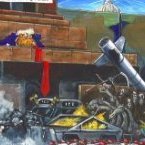Practicals The 'most Effective' Teaching Method
-
Recently Browsing 0 members
- No registered users viewing this page.
-
Topics
-
-
Popular Contributors
-
-
Latest posts...
-
140
Middle East Four journalists among 15 dead in Israeli strike on hospital
Wider reaction to the killings UN Secretary General António Guterres strongly condemned the "horrific killings" at Nasser hospital, which he said "highlight the extreme risks that medical personnel and journalists face as they carry out their vital work amid this brutal conflict", and called for a "prompt, and impartial investigation". The UK called the attacks "horrific" and "completely indefensible". Prime Minister Keir Starmer's official spokesperson said journalists should always be protected and the attacks illustrated the need for a ceasefire. French President Emmanuel Macron called the strikes "intolerable" and said civilians and journalists must be protected. He renewed the call for humanitarian aid to be allowed inside Gaza and for Israel "to respect international law". Germany's foreign office said it was "shocked". https://www.bbc.co.uk/news/articles/c80d2zrdj7vo -
6
Ukraine is winning the war
LOL, in the beginning I thought you're just lacking of basic knowledge and information, but now I see you're just stupid beyond comprehension . "credible news and evidence" -
0
Voter Tells GOP Lawmaker To ‘Get Your Head Out Of Trump’s Ass
https://www.huffpost.com/entry/mark-alford-town-hall_n_68ad3ee5e4b0753051889b37 -
49
Tattoos.
I don’t mind them at all on the girls. Especially like the extended ones such as up their leg across their back into their arm vs the single ones. Brings a whole new level of kink to the game. I like kink. -
17
Uk passport renew
If your ex has officially changed her daughter's name, then she will have a 'name change' certificate. These have the previous and new names in English text. You can use that to obtain a new UK passport in her new name. I think it more likely they are just using her Thai name using Thai text for ease, rather than officially changing her name. -
140
Middle East Four journalists among 15 dead in Israeli strike on hospital
Meanwhile, US President Donald Trump said he was unaware of the strikes, but when asked for his reaction he said he was "not happy about it". https://www.bbc.co.uk/news/articles/c80d2zrdj7vo
-
-
Popular in The Pub


.thumb.jpg.3ee24d9400fb02605ea21bc13b1bf901.jpg)
.thumb.jpg.b54783ad387f65d779e04f535fcfeee9.jpg)





Recommended Posts
Create an account or sign in to comment
You need to be a member in order to leave a comment
Create an account
Sign up for a new account in our community. It's easy!
Register a new accountSign in
Already have an account? Sign in here.
Sign In Now